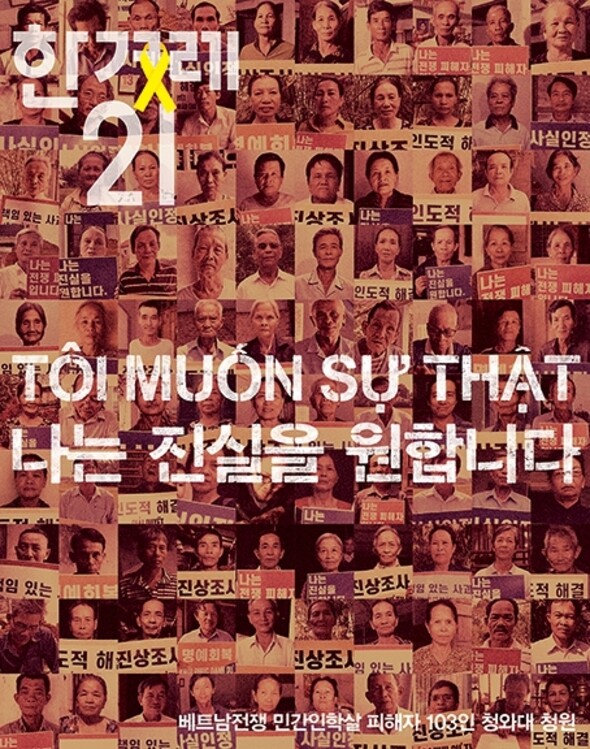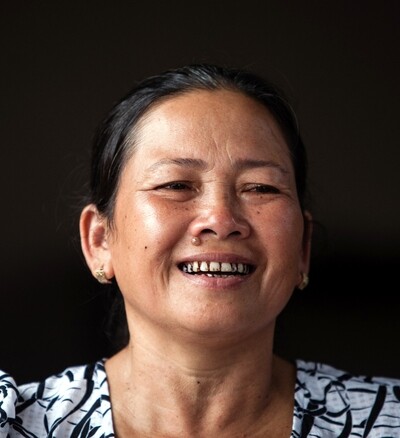hankyoreh
Links to other country sites 다른 나라 사이트 링크
103 Vietnamese victims want investigation, apology and compensation

On Apr. 22, Nguyen Thị Thanh, 59, a victim of civilian massacres by South Korean troops during the Vietnam War, visited Korea to participate in a “citizens’ peace tribunal” held to uncover the truth about the massacres. The tribunal was organized by MINBYUN-Lawyers for a Democratic Society and the Korea-Vietnam Peace Foundation.
A plaintiff in the citizens’ tribunal, Nguyen claimed that she’d been shot on the left side of her body by Korean troops near her home in the village of Phong Nhị, Dien Ban District, Quang Nam Province, on Feb. 12, 1968. After the massacre, she received an operation to reconnect her severed intestine and still suffers from the aftereffects of her injury today. Five of her family members were killed in the massacre, and her 14-year-old older brother was grievously injured.
The citizens’ tribunal concluded that the Korean troops had committed a massacre and ruled that the South Korean government ought to compensate the plaintiffs according to the conditions of the State Compensation Act and make an official apology to restore their dignity and reputation. That’s what Nguyen wants to hear from the South Korean government, but Seoul has never taken an official stance on this matter. Is there any chance of Nguyen’s wish coming true?
Victims plan to sue South Korean government with help of MINBYUN

Nguyen submitted a petition signed by 103 victims of civilian massacres to the Blue House on Apr. 4 and is planning to sue the South Korean government for compensation, represented by MINBYUN attorney Lim Jae-seong, within the year. That will be the first time that a victim of the Vietnam War has filed a lawsuit against one of the aggressor states. Nguyen is spending a week in Korea on this trip to prepare the documents that are necessary for the lawsuit.
“When Nguyen Thị Thanh returned to Vietnam after the citizens’ tribunal, she said the people in her village asked whether the Korean government had apologized and were skeptical that anything had changed. She’s suing the government because she wants official recognition of her suffering under a government body. Regardless of the outcome, getting a judicial decision will help trigger a public discussion about the anger and suffering of the victims of the civilian massacres,” Lim told the Hankyoreh.
This won’t be an easy battle, even if an official trial is held. One of the primary obstacles is the statute of limitations. A lawsuit for compensation from the state, which is a civil lawsuit, has to be initiated within five years of the date when the illegal action occurred. But in December 2005, the UN General Assembly affirmed the position that the statute of limitations does not apply to serious violations of international humanitarian law or to grave abuses of international human rights laws. The statute of limitations is expected to be disputed in the courts. That has always been a major controversy in lawsuits filed against Japan by Koreans who were victims of its colonial occupation.
Along with the lawsuit, Lim and Nguyen Thị Thanh are asking for the government to organize an investigation of the civilian massacres. In May 2018, a historical issues task force for the Presidential Commission on Policy Planning submitted a report to the Blue House asserting the need for an investigation into the suffering of civilians during the Vietnam War and for the establishment of a body to carry out that investigation. One of the reasons cited by the task force is that Seoul ignoring the victims’ requests for an apology and compensation would conflict with the attitude it has taken with the so-called comfort women issue, referring to the women forced to serve as sex slaves for the imperial Japanese army.
But since the Ministry of Foreign Affairs doesn’t favor an official investigation because of “diplomatic interests,” the Blue House is reportedly taking time to ponder the option. “While the Vietnamese government isn’t officially asking for an apology or reparations, neither is it interfering in the victims’ activity. There will have to be an investigation before the South Korean government can adopt a position about the Vietnam War,” Lim said.
Every time that civilian massacres during the Vietnam War have become an issue, Vietnam War veterans have voiced their displeasure. But Lim stressed that “uncovering the truth about history is also in the interests of the veterans.”
“Looking into illegal actions that may have taken place during the war doesn’t represent an attempt to hold individual soldiers accountable or to besmirch their reputation. Investigating these matters could also bring about a fair historical assessment of the victims’ suffering and sacrifices. We need to also be thinking about how to address veterans’ suffering.”
By Lee Seung-jun, staff reporter
Please direct comments or questions to [english@hani.co.kr]
Editorial・opinion
![[Column] Welcome to the president’s pity party [Column] Welcome to the president’s pity party](https://flexible.img.hani.co.kr/flexible/normal/500/300/imgdb/original/2024/0515/3917157400447943.jpg) [Column] Welcome to the president’s pity party
[Column] Welcome to the president’s pity party![[Editorial] Korea must respond firmly to Japan’s attempt to usurp Line [Editorial] Korea must respond firmly to Japan’s attempt to usurp Line](https://flexible.img.hani.co.kr/flexible/normal/500/300/imgdb/original/2024/0514/2317156736305813.jpg) [Editorial] Korea must respond firmly to Japan’s attempt to usurp Line
[Editorial] Korea must respond firmly to Japan’s attempt to usurp Line- [Editorial] Transfers of prosecutors investigating Korea’s first lady send chilling message
- [Column] Will Seoul’s ties with Moscow really recover on their own?
- [Column] Samsung’s ‘lost decade’ and Lee Jae-yong’s mismatched chopsticks
- [Correspondent’s column] The real reason the US is worried about Chinese ‘overcapacity’
- [Editorial] Yoon’s gesture at communication only highlights his reluctance to change
- [Editorial] Perilous stakes of Trump’s rhetoric around US troop pullout from Korea
- [Guest essay] Preventing Korean Peninsula from becoming front line of new cold war
- [Column] The state is back — but is it in business?
Most viewed articles
- 1[Column] Welcome to the president’s pity party
- 2Could Korea’s Naver lose control of Line to Japan?
- 3Naver’s union calls for action from government over possible Japanese buyout of Line
- 4[Editorial] Korea must respond firmly to Japan’s attempt to usurp Line
- 5Korean opposition decries Line affair as price of Yoon’s ‘degrading’ diplomacy toward Japan
- 6Second suspect nabbed for gruesome murder of Korean in Thailand, 1 remains at large
- 7Korea cedes No. 1 spot in overall shipbuilding competitiveness to China
- 8US has always pulled troops from Korea unilaterally — is Yoon prepared for it to happen again?
- 9Scientists develop technology to make next-generation solar cells
- 10S. Korean gaming companies driven overseas